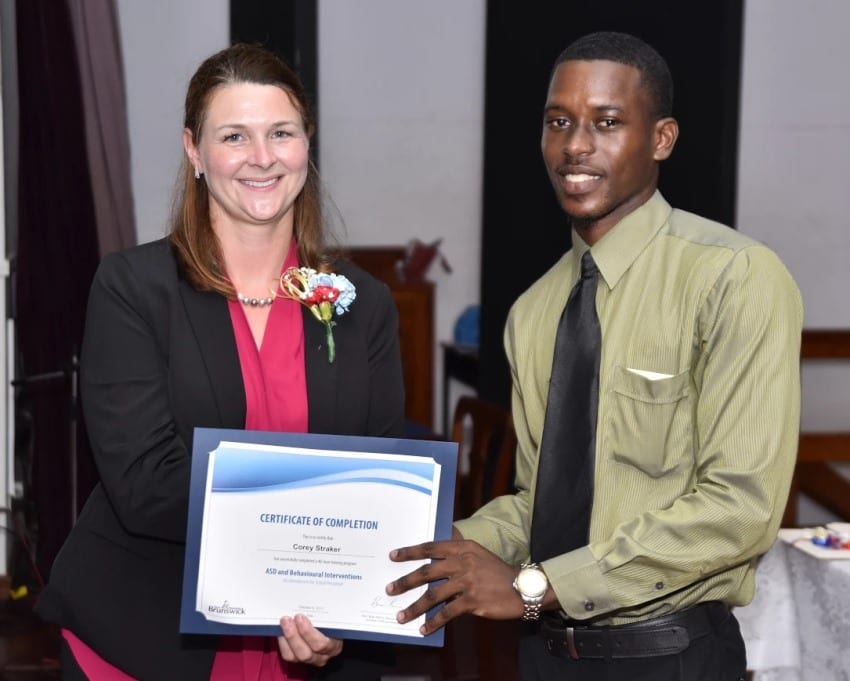
Learning Specialist, Isabelle Cowan, presenting Corey Straker with his Certificate of Completion. (E.Walker/MRD)
Barbados’ response to challenges within the education system does not merely focus on improving performances but also on the creation of an inclusive society.
This was underscored recently, as Parliamentary Secretary in the Ministry of Education, Science, Technology and Innovation, Senator Harry Husbands, addressed a graduation ceremony at Queen’s College for 86 teachers who participated in an online course on Autism Spectrum Disorders (ASD). The programme was facilitated through the New Brunswick Department of Education and Early Childhood Development, Canada.
Speaking on behalf of Education Minister, Ronald Jones, Senator Husbands noted that the World Health Organization’s fact sheet of April 2017 reported autism as the fastest growing serious developmental disability in the world, with current figures for autism standing at one in every 160 births globally.
Of the situation here, he said: “We in Barbados currently have several classes in our special schools and one at St. Christopher’s Primary, catering to students with ASD. Eighty-six Barbadians are currently in our public school system with ASD. We in Barbados therefore have to respond to the increasing prevalence of ASD; we have to ensure that our teachers, our tutors at the Erdiston Teachers’ Training College and Ministry personnel are all equipped with the effective strategies to manage students within our school system who appear along the autism spectrum.”
The Parliamentary Secretary then stressed it was more than about improving performances in school. He told the first cohort: “I think it has a much deeper meaning; it is about the creation of a more inclusive society. Think of all the students in Barbados who might have gone through the entire school system with autism and in our ignorance, at the time, in the good ole days, we didn’t recognize these challenges. These children probably sat at the back of the room somewhere or were put in the corner or some sent to the office or generally ignored…
“So this is more than improving test scores, or teaching reading or gaining better marks in the Common Entrance; this is about creating opportunities for all citizens of Barbados irrespective of what challenges they face. You may be autistic; you may be dyslexic [but] in a progressive and inclusive society we try to create opportunities for all people.
While urging the teacher graduates to put their “newly-gained knowledge and skills” on display for the benefit of their students, Senator Husbands reminded them it was not only students along the autism spectrum who stood to benefit but others as well.
“Make the best use of it. I urge you to use the learning from the online course to make a difference in your classrooms as you are well-positioned to impact on your students’ lives and transform their social and communication deficits so that they can function in their communities and build relationships similar to that of their peers,” he stressed.
The two facilitators from the New Brunswick Department of Education and Early Childhood Development, Canada – Learning Specialist, Isabelle Cowan and Lead Content Writer of the course, Catherine Breault – were praised for imparting the skills necessary for identifying ASD while Chief Education Officer, Karen Best was commended for coming up with creative ways to ensure these skills were provided despite limited financial resources.
The New Brunswick online course which ran from October 2016 to April 2017 and supported by face-to-face sessions conducted by the two facilitators at Erdiston Teachers’ Training College last week. The training course was one of the activities for Education Month 2017.
